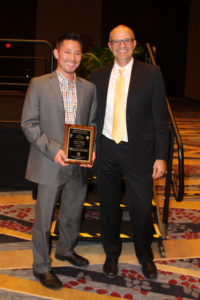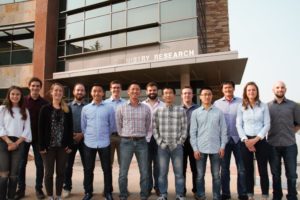 From LEGO kits to nanostructured polymers, Colorado State University Assistant Professor of Chemistry and CSU alumnus Garret Miyake has built a lot of big things from little pieces.
From LEGO kits to nanostructured polymers, Colorado State University Assistant Professor of Chemistry and CSU alumnus Garret Miyake has built a lot of big things from little pieces.
For his work in polymer science, Miyake was awarded the 2017 ACS Division of Polymer Chemistry Mark Young Scholar Award last month in Washington, D.C. The biannual award is presented to scholars under 35 years old by the American Chemical Society’s Division of Polymer Chemistry. It recognizes excellence in research and leadership in polymer science, and is one of the most prestigious awards in polymer chemistry.
The award came just after Miyake started working at CSU, where he received his Ph.D. in chemistry in 2011. He had been working as an assistant professor of chemistry at the University of Colorado Boulder since 2014.
Miyake was also recently awarded a 2017 Sloan Research Fellowship in Chemistry by the Alfred P. Sloan Foundation, which provides promising scientific leaders with $60,000 for research.
Miyake said that the recognition for the awards should go to his research team in the Miyake Research Group, which includes Ph.D. students, postdoctoral researchers, and undergrads in the Department of Chemistry. It is housed in the new Chemistry Research Building.
“It was really exciting to see my research group’s work get recognized at that level,” he said. “The people in my group work extremely hard, so I’m glad that they’re rewarded for their efforts.”
Polymer power
The awards are a culmination of Miyake and his team’s research into polymers, or plastics, which are large molecules that are built from many smaller repeating units, Miyake said. He likes to think of them as LEGO bricks.
“As you put the pieces together, you make a bigger molecule, or polymer,” he said. “The more different types of LEGOs you have, the more creative you can be in building more interesting structures, which have unique applications.”
However, manufacturing polymers on an industrial scale takes a lot of energy, so Miyake and his team are investigating more energy-efficient ways to make polymers. They are also looking at applications for different types of polymers, such as photonic crystals. These materials are “structurally derived colors,” which, unlike colored dyes that can fade over time, have a color based on their molecular structure.
“It’s like in a butterfly, for example,” Miyake said. “There are no dyes or pigments in it like our clothes.”
He hopes to use these materials to create, for instance, heat-reflective coatings for windows in warm climates, which would reduce the use of air conditioning. Miyake calculated that the reduced pollution every year would be equivalent to removing 3 million cars from the road.
A history of chemistry
Miyake grew up in Oregon and as a kid was always interested in biology and engineering. He was also fascinated by the idea of building new things, and often played with LEGOs.
“I always liked to buy as many different LEGO kits as I could possibly buy and then mix them all together,” he said.
He got his start in polymer science after his sophomore year of college at Pacific University, when a professor offered him a summer job at a chemistry lab. One day that summer, Miyake decided to conduct an experiment on his own to convert two liquids into nylon thread.
“I thought it was amazing that you could take liquids and mix them together and instantly make polymeric materials,” he said. “It was the first polymer I made, and ever since then I was hooked.”
Miyake went on to earn his Ph.D. in chemistry at CSU, then worked as a postdoctoral researcher at the California Institute of Technology. In 2014 he became an assistant professor at the University of Colorado Boulder, and in August he moved back to Fort Collins to become an assistant professor in the Chemistry Department in the College of Natural Sciences.
Miyake is always looking to achieve new milestones, but despite his recent awards, he said that his favorite part of the job is working with his students.
“I really enjoy mentoring the students and watching them evolve as scientists,” he said.
The Mark Young Scholar Award is named after Herman F. Mark, a chemist who helped develop polymer science. The Sloan Research Fellowship is named for Alfred P. Sloan, an industrialist and former CEO of General Motors. Seventeen recipients of the chemistry fellowship have gone on to win the Nobel Prize in Chemistry.
